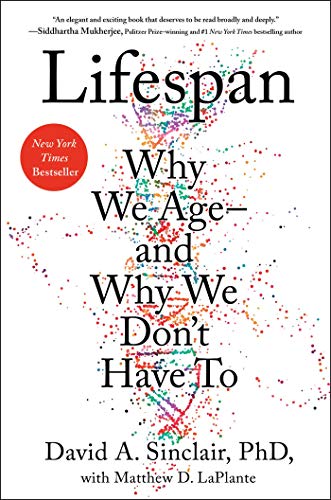 In “Lifespan: Why We Age and Why We Don’t Have To,” David A. Sinclair presents a fascinating and thought-provoking look into the latest scientific research on aging and longevity. Sinclair is the real deal. He’s got his own lab at Harvard Med School and is a leading researcher in the field of aging, presents a compelling argument for the idea that aging is not an inevitability, but rather a disease that can be treated and potentially even reversed.
In “Lifespan: Why We Age and Why We Don’t Have To,” David A. Sinclair presents a fascinating and thought-provoking look into the latest scientific research on aging and longevity. Sinclair is the real deal. He’s got his own lab at Harvard Med School and is a leading researcher in the field of aging, presents a compelling argument for the idea that aging is not an inevitability, but rather a disease that can be treated and potentially even reversed.
The book is well-researched and well-written, making it accessible to everyone. Data geeks and science types, like me, are guided to detailed reports and papers on the topic, but you don’t need to read them to get a lot out of the book. Sinclair expertly guides readers through the intricacies of aging research, explaining complex concepts in a clear and concise manner. He also provides a thorough overview of the various theories of aging and the evidence supporting them.
One of the strengths of the book is Sinclair’s emphasis on the potential for interventions to extend healthspan, or the period of life during which one is free of serious illness. He highlights the promising research on compounds such as rapamycin and NAD+ precursors, which have been shown to have anti-aging effects in animal models. Sinclair also discusses the potential for lifestyle interventions, such as calorie restriction and exercise, to improve healthspan.

SPARK and Fire – hard sci-fi that you’ll love. Buy them here. Then leave a review. Authors love reviews. The feedback is nice and they boost sales.
One of the most interesting aspects of the book is Sinclair’s exploration of the social and ethical implications of extending the human lifespan. He acknowledges the potential downsides, such as overpopulation and economic strain, but also presents the argument that a longer, healthier life could lead to a more productive and fulfilling existence.
Overall, “Lifespan” is a thought-provoking and enlightening read. Sinclair presents a compelling case for the idea that aging is not an inevitability and that interventions have the potential to extend healthspan. It is a must-read for anyone interested in aging and longevity research.
Sinclair stops short of selling anything beyond his ideas, but he does give some insight into his regimen:
1 gram (1000 mg) per day of both NMN (Nicotinamide Mononucleotide) and Resveratrol. Taken in the morning. There’s a good deal of the science and research behind this decision discussed in the book. It seemed sound enough to me that I’ve started taking these supplements myself. Both are available online and without a prescription. Not cheap.
Metformin – This is a prescription drug but has gotten a lot of press for increasing longevity in studies. It’s generally used to treat Type II diabetes. There are also some down sides, including an accommodation period where people may suffer gastric distress. I’m not ready to jump on board with this one yet.
The only other one I’ll mention in this post is Trimethylglycine (TMG). One downside of taking NMN is that it can deplete energy and occasionally lead to depression. The scientific explanation is here. I’ll probably add this, and update after a few months. He suggests other supplements as well, but I’ll leave those for another post.
On the Feral Scale, Lifespan is an 8 for the story (it’s more interesting than some novels I’ve read recently) and a 10 for the science.

brb buying those right now
Yes, please do!